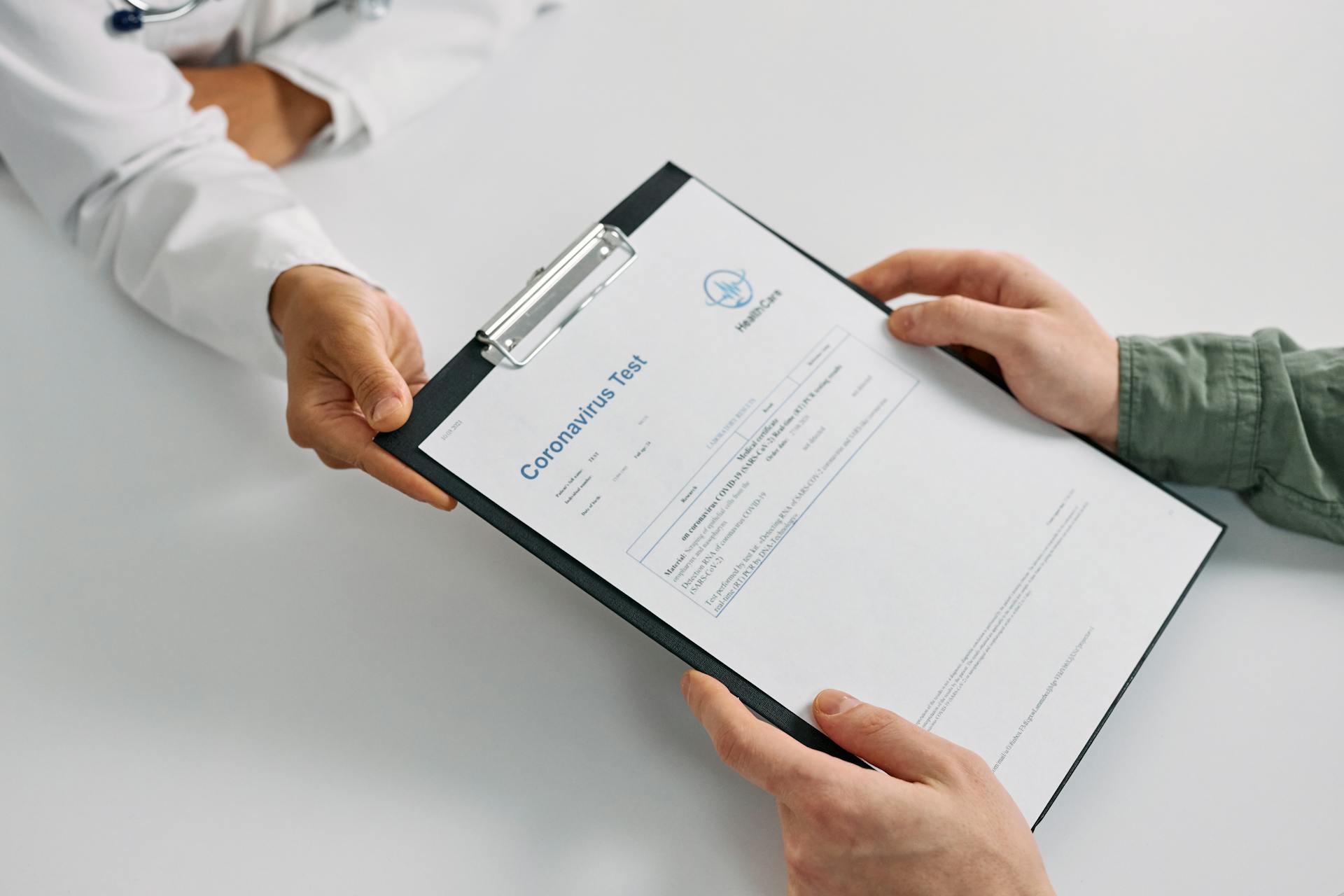
Medical bills can be overwhelming, but you have options to make them more manageable. Many hospitals and healthcare providers offer financial assistance programs to help patients pay their bills.
You can also negotiate your medical bill with the provider. According to the article, some providers may be willing to reduce the bill by 20-50% if you ask. This is a common practice, but it's essential to ask and be prepared to explain your situation.
If you're struggling to pay your medical bill, you might be able to set up a payment plan with your provider. This can be a monthly payment plan that's tailored to your income and expenses. For example, some providers offer plans that allow you to pay a fixed amount each month for a set period.
Negotiating with your provider can be intimidating, but it's worth a try. Don't be afraid to ask questions and explain your financial situation. You can also seek help from a patient advocate or a non-profit credit counseling agency.
Financial Assistance Programs
Financial assistance programs can help you pay for medical bills you can't afford. Many hospitals and healthcare providers offer these programs, but you need to ask about them.
Nonprofit hospitals are required to have written policies establishing eligibility criteria for financial assistance. This means they have to have a plan in place to help patients who can't afford their medical bills.
If you have an outstanding bill for healthcare services, appointments, or pharmacy prescriptions through Kaiser Permanente, you may be eligible for their Medical Financial Assistance (MFA) program. The program provides financial assistance to qualified patients who are having difficulty paying their medical and pharmacy bills.
To be eligible for MFA, your family income must be at or below 300% (in certain states) or 400% (in California, Oregon, and Northwest Washington) of the federal poverty guidelines. You may also be eligible if you have unusually high medical and/or pharmacy expenses, regardless of household income.
There are also public programs and private organizations that may be able to help you tackle your medical bills. These organizations can help you learn more about the kinds of financial assistance available to you, and they may offer resources for things like prescriptions.
Some organizations to look into include:
- USA.gov for medical and health care benefits.
- State Health Insurance Assistance Program (SHIP) for help navigating Medicare.
- The Healthwell Foundation, the Patient Access Network (PAN) Foundation and UnitedHealthcare Children’s Foundation for help with things not covered by insurance, or help finding grants.
- NeedyMeds for help finding prescription assistance programs and drug coupons.
Nonprofit hospitals must offer financial assistance to patients who can't afford their medical bills as long as the service is considered "medically necessary." This includes inpatient hospital stays and emergency room visits.
Payment Options
With a kp.org account, you can view your medical bills and make payments online. You can also use guest pay to make one-time medical bill payments on behalf of another member.
Certain medical bills include the option to set up a 0% interest payment plan, which allows you to break the bill into multiple equal payments over a few months. You can review each of your medical bills and select Set up a payment plan to begin making automatic monthly payments toward the balance.
The minimum amount you can pay on your payment plan will depend on your bill amount and the terms you negotiate, and you should also ask about any billing charges or fees associated with the payment plan.
Online Pay

With a kp.org account, you can view your medical bills and make payments online. This is a convenient way to stay on top of your medical expenses and avoid late fees.
You can also use guest pay to make one-time medical bill payments on behalf of another member, making it easy to help a family member or friend with their medical bills.
By paying your medical bills online, you can save time and effort compared to mailing in payments or calling the provider.
Payment
You can view your medical bills and make payments online with a kp.org account. This allows you to keep track of your medical expenses and make timely payments.
To pay your medical bills online, you can log in to your kp.org account and navigate to the Billing Summary section. From there, you can view each of your medical bills and select the option to make a payment.
You can also use guest pay to make one-time medical bill payments on behalf of another member. This is a convenient option if you need to make a payment for someone else.
Certain medical bills include the option to set up a 0% interest payment plan. This allows you to break down your bill into multiple equal payments over a few months until the total is covered.
The minimum monthly payment on a payment plan will depend on your bill amount and the terms you negotiate. You can usually break the bill into multiple equal payments over a few months until the total is covered.
If you're unable to negotiate a lower price with the billing manager, you may be able to set up a payment plan that allows you to pay off your medical bill in installments.
Hospital and clinic bills are usually interest-free, making it more affordable to pay off your medical bill in monthly installments. This can be a more affordable option than paying off a credit card balance.
You may also be able to apply for a medical credit card to help pay off your medical expenses. However, be aware that medical credit cards often have a deferred interest rate that can make your debt more expensive if you don't pay off the full amount within the promotional period.
If you don't qualify for a medical credit card, you may be able to explore other credit options, such as a personal loan or a 0% interest credit card. However, be sure to shop around and compare rates, fees, and repayment terms before making a decision.
Alternative Solutions
If you're not a good fit for a medical credit card, you can explore other credit options. Personal loans can help you consolidate medical expenses or pay for emergency or planned procedures, but they come with risks of additional interest, fees, and negative credit score impact if you miss payments.
Loan amounts for personal loans typically range from $1,000 to $100,000. To minimize risks, compare rates, fees, and repayment terms before applying.
A 0% interest credit card could be a good option, but you'll need good to excellent credit to qualify. Be sure to pay off your balance before the promotional interest period ends and an interest rate kicks in.
Charitable Health Coverage
Charitable Health Coverage offers a lifeline for those in need, providing coverage and subsidies to qualified applicants. This program helps pay for monthly premiums and most out-of-pocket medical costs at Kaiser Permanente facilities.
Kaiser Permanente's Charitable Health Coverage program is a game-changer for many people, offering a more affordable way to access healthcare.
Consider Alternative Credit Options
If you don't opt for a medical credit card, you may be able to explore other credit options.
Personal loans can help you consolidate medical expenses or pay for emergency or planned procedures, with loan amounts typically ranging from $1,000 to $100,000.
Getting a personal loan can be a good option after exhausting other options, but it also comes with risks of additional interest, fees, and negative credit score impact if you miss payments.
A 0% interest credit card could be a good option, but you'll need good to excellent credit to qualify, and be sure to pay off your balance before the promotional interest period ends.
Dedicating the card only to medical bills is a good idea, as it'll be harder to keep records of the expenses for tax deductions or a medical savings account if you use it for other things.
Missing payments or paying late on a credit card can have a negative effect on your credit score, so be sure to make timely payments.
Advocacy and Support

You can hire a medical bill advocate to negotiate your medical debt on your behalf. They're experts in medical billing who know how to read health care bills and understand common costs for procedures.
Make sure you do your research and know who you're talking to, as there are predators out there who might steal your money or identity.
Some medical bill advocates can spot potential errors or overcharging and help you reduce the amount you owe.
Before signing up for a plan, make sure any fees charged by a medical bill advocate would be outweighed by the savings.
If the billing office can't lower a charge to a rate you can afford, consider reaching out to a patient advocacy group.
Patient advocacy groups often have financial assistance resources and programs that help people with financial burdens.
Appeals and Negotiations
If you're having trouble paying your medical bill, don't panic. You have the right to appeal a denial of coverage with your health insurance company, disability insurance company, Medi-Cal or Medicare. In this case, the hospital may not sue or report you to a credit reporting agency until a final determination is made.

You can also negotiate a reasonable payment plan with the hospital while you're in the process of applying for the Fair Price discount or charity care. This means you can make regular partial payments of a reasonable amount without fear of being sent to collections.
Here are some key things to keep in mind:
- Don't try to negotiate a payment plan while you're in the process of applying for charity care or the Fair Price discount.
- The hospital may not sue or report you to a credit reporting agency if you're appealing a denial of coverage.
If you're unable to negotiate a lower price with the billing manager, don't worry - you can still request or negotiate a payment plan. This might involve breaking up your medical bill into several monthly installments, allowing you to pay it off bit by bit over time.
Discounts and Reductions
Discounts and Reductions can help you save money on your medical bills. The Hospital Fair Pricing Act requires hospitals to offer a discount rate, usually 65-85% less than the Charge Master rate.
You can ask the hospital to show you that they didn't go over the Medicare or other government rate to ensure you get the correct Fair Price discount. If you already paid more than you should have, request reimbursement for the amount overpaid, with interest.
Asking for a reduced fee can often cut your debt in half. Be prepared to provide a recent tax return when you call the billing office, as they may use this information to determine your eligibility for a reduced fee.
Discount Amount
The discount amount under the Hospital Fair Pricing Act can be a significant reduction from the original charge. Most hospitals use the Medicare rate, which is usually 65-85% less than the Charge Master rate.
You can find average Medicare rates for common hospital procedures online. However, hospital billing can be complex and difficult to understand.
To ensure you get the correct Fair Price discount, ask the hospital to show you that they didn't exceed the Medicare or other government rate. This will help you verify the discount amount.
If you've already paid more than you should have, request reimbursement for the amount overpaid, including interest.
Request Fee Reduction
You can ask the hospital to reduce your bill, and it's worth a shot. Most hospitals use the Medicare rate, which is usually 65-85% less than the Charge Master rate.
Having a recent tax return handy can help the billing office decide on a reduced fee based on your income level.

You can also research the average cost of your procedure in your state to use as evidence for a reduction if you're being overcharged. Healthcare Bluebook and Healthcare Cost and Utilization Project provide data on the average price of several medical services.
Even if your income is too high to qualify for charity care, you can still get a reduction of your bill if you can show the medical bills are causing you financial hardship.
Error Checking and Advocacy
Error checking and advocacy are crucial steps in managing your medical bills. You can start by reviewing your medical bill for errors, which are more common than you might think, with as many as 80% of medical bills containing a mistake.
Some common medical billing errors include duplicate charges, incorrect billing, upcoding, unbundled charges, and incorrect codes. It's essential to request an itemized bill from your healthcare provider to identify these errors.
To check for errors, compare your EOB with your medical bill to ensure the charges are the same. Consult your insurer if you have health insurance, as they may fix errors on your medical bill and provide a copy of your EOB.
You can also scan your medical bill for duplicate charges, and make sure that a healthcare provider only bills you for services you received. If you notice any errors, call the billing office and ask them to recode and re-bill your insurer.
If the billing office cannot lower a charge to a rate acceptable to your budget, consider reaching out to a patient advocacy group. These groups often have financial assistance resources and programs that help people with financial burdens.
Here are some tips to help you check for possible errors on your medical bill:
- Compare your EOB with your medical bill to ensure that the charges are the same.
- Consult your insurer if you have health insurance.
- Make sure that a healthcare provider only bills you for services you received.
- Scan your medical bill for duplicate charges.
Insurance and Benefits
You'll receive an Explanation of Benefits (EOB) before getting a medical bill, which provides information about the cost of your services and what you can expect to pay.
An EOB lists the date of each service and the total cost of your care, including annual visits, lab tests, and screenings. You can use this information to see what services are included and what you can expect to pay.
Here are the different types of charges on an EOB:
- Allowed charges: This is the maximum cost a healthcare provider will receive for your services.
- Paid by insurer: This is what your insurer will pay a healthcare provider if you have health insurance.
- Provider charges: This is the total amount a healthcare provider charges for your services.
- What you owe: Also called "patient balance", this is what you owe after your health insurance pays.
Health Savings Accounts (HSA) & HRAs
Health Savings Accounts (HSA) and Health Reimbursement Arrangements (HRA) can be a game-changer for medical expenses. An HSA is a savings account that can be used to pay for medical expenses, while an HRA is an employer-funded health plan that offers tax-free reimbursements for qualified medical expenses.
HSAs allow you to save money for medical expenses on a tax-free basis, and the funds roll over from year to year. If you have an HRA, your employer contributes to it, and you can use the funds to pay for qualified medical expenses.
To take advantage of these benefits, it's essential to understand the eligibility requirements and how they work together with your health insurance plan.
Understanding Insurance Charges
You'll receive an Explanation of Benefits (EOB) before getting a medical bill, which provides information about the cost of your services, including what your health insurance covers and what you can expect to pay.
An EOB lists the date of each service and the total cost of your care, including different types of charges such as allowed charges, paid by insurer, provider charges, and what you owe.
You can use your EOB to compare the cost of your healthcare services to those listed, which may help you reduce your medical bills. By doing so, you can identify any potential errors or discrepancies.
Here are the types of charges you might find on an EOB:
Your EOB will also include a claim number that you can use for reference if you call your health plan with questions about your medical bill.
Frequently Asked Questions
What is the lowest payment you can make on medical bills?
There is no minimum monthly payment required by law for medical bills. Making a payment, regardless of the amount, does not necessarily prevent hospitals from taking further action.
What happens when people can't pay their medical bills?
When people can't pay their medical bills, they may face serious consequences, including health problems, financial ruin, and even bankruptcy. Unpaid medical debt can have a ripple effect, impacting not just finances, but also overall well-being.
Sources
- https://healthy.kaiserpermanente.org/help-paying-your-bill
- https://www.nerdwallet.com/article/finance/pay-medical-debt
- https://health-access.org/consumer-protection/hospital-bill-help/
- https://www.peoplekeep.com/blog/the-secret-to-negotiating-lower-medical-bills
- https://www.health.com/money/negotiate-medical-bills
Featured Images: pexels.com


